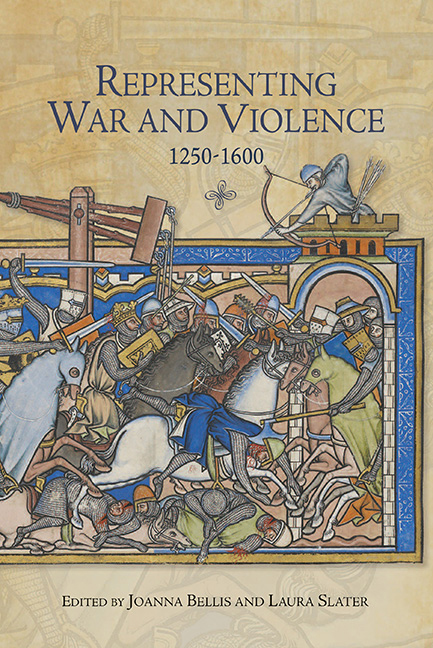Book contents
- Frontmatter
- Contents
- List of Illustrations
- Acknowledgements
- List of Contributors
- Introduction: ‘Representation’ and Medieval Mediations of Violence
- Part I The Ethics and Aesthetics of Depicting War and Violence
- Part II Debating and Narrating Violence
- 4 ‘With face pale’: Melancholy Violence in John Lydgate's Troy and Thebes
- 5 ‘In Praise of Peace’ in Late Medieval England
- 6 Representing Political Violence in La Estoire de Seint Aedward le Rei
- Part III Experiencing, Representing and Remembering Violence
- Bibliography
- Index
5 - ‘In Praise of Peace’ in Late Medieval England
from Part II - Debating and Narrating Violence
Published online by Cambridge University Press: 05 September 2016
- Frontmatter
- Contents
- List of Illustrations
- Acknowledgements
- List of Contributors
- Introduction: ‘Representation’ and Medieval Mediations of Violence
- Part I The Ethics and Aesthetics of Depicting War and Violence
- Part II Debating and Narrating Violence
- 4 ‘With face pale’: Melancholy Violence in John Lydgate's Troy and Thebes
- 5 ‘In Praise of Peace’ in Late Medieval England
- 6 Representing Political Violence in La Estoire de Seint Aedward le Rei
- Part III Experiencing, Representing and Remembering Violence
- Bibliography
- Index
Summary
To praise ‘peace’ during the Hundred Years War was to draw upon a constellation of intersecting discourses (religious and political, utopic and critical) in a complex rhetorical gesture that could serve idealistic, pragmatic or cynical ends. Peace – allegorised, eulogised, disparaged – is found everywhere in the pages of late medieval writing: as a beleaguered plaintiff against Wrong in Piers Plowman, as the doctrine of Dame Prudence's counsel in Melibee, and as the subject of entire works by John Gower and Christine de Pizan. Peace is lauded in texts critical of war (Richard de Bury's lament for the loss of books in the Philobiblon), yet also extolled in crusade propaganda (Philippe de Mézières's Epistre au Roi Richart) and pro-war cultural productions (the Singularis laudis digna motet for Edward III). Peace-making is a spiritual virtue, a literary trope and a factional alignment – for the ‘blessed’ as well as for those who stand to benefit from an appeal to concord. In political propaganda, in court poetry, and in literature of counsel, the energies of these apparent antonyms, ‘war’ and ‘peace’, are often intertwined in striking ways.
Peace is theological: a sign of grace, a gesture of reconciliation, the quietude of the restful soul. It is also social: the divine order mirrored in civil concordia. However familiar from the page and the pulpit, peace evades permanent residence in the temporal world. Peace maintains an otherworldly quality, always more doxa than praxis. It lures towards the eschatological journey beyond even as it makes itself desired on earth. Christ, the ‘Prince of Peace’ prophesied by Isaiah (9:6), ‘[made] peace through the blood of His cross’ (Colossians 1:20) and bestowed peace as a parting gift to his disciples: ‘Peace I leave with you; my peace I give you. Not as the world giveth do I give to you’ (John 14:27). Christ's peace is transcendent, otherworldly: ‘the peace of God, which surpasseth all understanding’ (Philippians 4:7). A blessing of God (Psalm 29:11) and legacy of the meek (Psalm 37:11), peace is intimately related to justice, an ideal that, like peace, will only be realised in the fullness of eschatological time.
Yet ‘peace on earth’ requires legal and political structures to maintain or approximate it, and these structures could be violently enforced. To breach the King's Peace, in English common law, is to commit a criminal act.
- Type
- Chapter
- Information
- Representing War and Violence, 1250-1600 , pp. 95 - 115Publisher: Boydell & BrewerPrint publication year: 2016



